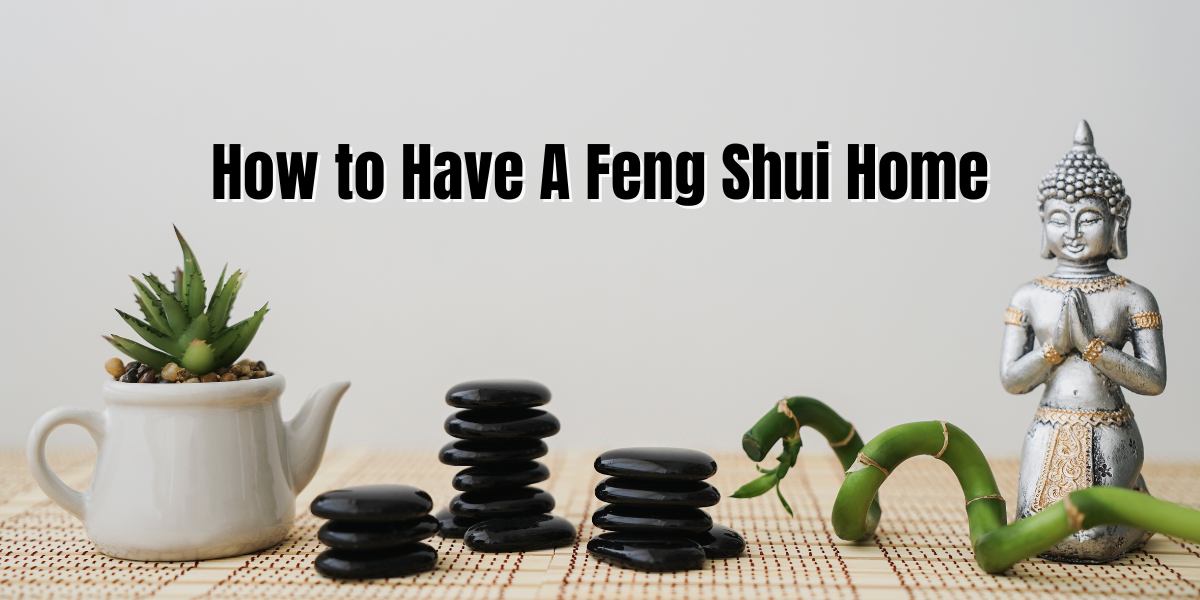You’ve probably heard stories of people purchasing houses facing a specific direction or spending a lot of money on expensive crystals to attract luck.
That’s because of Feng Shui, a millennial practice that has gained great popularity over the years. Let’s find out how to have a Feng Shui home and everything about it.
What Is Feng Shui?
It is an age-old Chinese art and science that dates back 6,000 years. It describes how where things are placed in your space influences the energy flow and, consequently, your energy flow.
It is based on the concept that your environment has an impact on your relationships, success, physical and mental health, as well as your level of monetary comfort.
Using feng shui, you may improve the qi, or positive energy, in your home. If your home has good feng shui, you are set up to attract good fortune, which could include riches and health. Your connections may go more smoothly, too.
Origins Of Feng Shui
The word “Feng Shui” literally translates to “wind-water”. It is stated that the wind’s movement over the sea is ideal for this concept. It is one of the Five Arts of Chinese Metaphysics and is categorized as physiognomy (the mathematical and formulaic study of appearances). Feng Shui uses the “invisible forces” known as Chi (Qi) that connect the cosmos, the earth, and humans to address buildings.
During the government-imposed Cultural Revolution of the 1960s, it was outlawed in mainland China but has subsequently gained favor.
It was historically implemented to orient buildings in a way that would bring luck to them. Depending on the Feng Shui school, a site could be considered fortunate by referring to nearby elements like water bodies, stars, or a compass.
This age-old technique for building and designing homes and companies promotes joy, prosperity, and harmony. It comprises interior design, garden design, urban planning, and architecture.
What Are the Benefits Of Good Feng Shui In Your Home?
Anyone familiar with Feng Shui has a decent understanding of what it can achieve for you. You can do it to attract fortune or love. Yes, Feng Shui can help you with those, but it also has a lot of other advantages.
Attracts Love
Love is the second most popular advantage people seek, according to Feng Shui experts’ experiences and observations. They discovered that most females desire love, but most males aim primarily for cash and professional accomplishments.
Professional Growth And Stability
The north side of the home, according to the Bagua, represents career. There shouldn’t be any negative Qi (or Xa) there, and there shouldn’t be a shortage of space or surface area either.
Career advancements may also be aided by a person’s Prosperity region, as it can increase one’s drive and motivation.
Wealth
Feng Shui is most frequently employed to attract money in Asia. Most tycoons use it and frequently enlist either covert or overt assistance in this field.
Water elements like fish tanks are one way to improve wealth in home Feng Shui. Utilizing your Kua-determined Prosperity area (Shen Chi) and Health area (Tien Yi) are other strategies to increase money.
Health Benefits
Your health can be significantly improved by Feng Shui. Feng Shui for health is typically applied to the sick or old (although this does not imply that you may disregard exercise, a healthy diet, or sleep).
A person’s health is influenced by their Kua’s Tien Yi or Health area. Place your bedroom in such a section of the house to improve your health. Choose the bedroom on the North side of the house, for instance, if your Tien Yi area is in the North. If it isn’t possible, try positioning your bed at the north end of the room, which will also benefit your health.
Enhances Social Connections
Relationships are influenced by the Yan Nien area of harmony. That includes all kinds of connections, such as those to your family, friends, and place of employment, that can assist in your promotion or help you stay in your job. Make sure that no bad Feng Shui affects this location once more.
Energy and Motivation
A person’s level of energy and motivation is influenced by their obstacle area (Huo Hai), which is dependent on their Kua. The Obstacles region is better suited for storage, restrooms, or kitchens, just like other unlucky areas. However, a bedroom or study space in your Prosperity Area might boost your vitality and drive.
Large plants should be positioned in the Eastern part of your home, as this is another technique to boost motivation (and creativity).
Mental Health
Depression, among many other issues, can be brought on by the Bagua’s concave or absent Southwest region. Also, depending on where in your home it is, your Total Loss area (Jue Ming) may have a similar impact.
Clutter has been mentioned as a Feng Shui element by several schools of art. Even though clutter isn’t truly a part of classical Feng Shui, decluttering has several advantages. Reduced stress and a lower risk of developing depression are two of these advantages.
Principles of Feng Shui
Many of these terms and symbols will probably become more frequent as you learn about Feng Shui. Consider this a basic introduction to these ideas.
The Five Elements
The Five Elements Method was employed to explain how various phenomena interacted with one another. It is present in many early Chinese thinking disciplines, including Feng Shui, martial arts, traditional Chinese medicine, music, and military strategy. Additionally, it is used in acupuncture, Tai Chi, and Chi Gong.
Wood (mù), Fire (hu), Earth (t), Metal (jn), and Water (shu) are the Five Elements. They individually contribute greatly to producing the ideal environment and are the cornerstone of Feng Shui.
The Bagua
In all Feng Shui schools, the Bagua is a crucial tool. Eight diagrams known as the Bagua (sometimes spelled Pakua; literally “eight symbols” or “eight areas”) are used in several Chinese teachings to illustrate a variety of interconnected ideas. Each one has three lines, each of which is either “broken” or “unbroken,” signifying a yin line or a yang line, respectively. In English, they are frequently referred to as “trigrams” because of their tripartite structure.
The Command Position
One of the more fundamental ideas in Feng Shui is the command position. It can be used to select where to place furniture in a room, such as a desk, bed, or chair. If feasible, the doorway leading into the room should be visible from your desk. Another benefit is having a wall without any furniture immediately behind you while you work.
Colors
You can use the Bagua map to decide what colors to use in a place. For instance, you may use purple, some greens, and some blues in your house’s “Wealth and Abundance” room (perhaps your home office), as these hues are typically associated with the energy of success.
Ying Yang Energies
It is a reference to Chinese philosophy, which holds that everything is complementary and made of opposing energies, such as masculine and feminine, dark and light, or cold and warm. Both are necessary to achieve balance in a space.
Feng Shui Tips For Your Rooms
- The interior of the main door should be clear of any walls, bathrooms, or stoves. The ‘Mouth of Chi’ is the front door, where energy enters your home.
- Your guests must be able to navigate your room by following the flow of your artwork. It is ideal to accommodate them with furniture, such as a coat rack and some rags, so they can pause and admire your entryway before you graciously let them inside.
- The front door should not be directly in line with the back door or window.
- The center of the house should not have restrooms or utility rooms.
- The stove must not see the door.
- A hallway or stairway cannot split the house in half because this would create conflicts within the family.
- Beds and doors shouldn’t be lined up.
- Place each bed next to a sturdy wall.
- Toilets are not permitted to be located next to beds, above doors, across from main doors, opposite stoves, or in alignment with main doors.
- Be mindful of where you place the components in the kitchen to create balance. For example, avoid putting water near the fire (like a sink next to the stove) because, according to Feng Shui, water puts out fire.
FAQs
Does Feng Shui Have Any Ties to Religion Or Other Esoteric Practices?
No. Religion in no way has anything to do with feng shui. The I-Ching, also known as “the Book of Changes,” which contains all of the knowledge and fundamental truths of Nature, is the source of all of the Feng Shui principles and beliefs. Traditional Yang Sang Feng Shui is an old naturalistic science that teaches us how to match our architectural designs with the magnetic energy patterns of the ground to create the most beneficial living spaces.
Can Small Spaces Benefit From From Feng Shui?
Yes! Feng Shui tools and principles can be used to produce positive ch’i that will improve the well-being of the people who occupy any area, from a studio apartment to a huge home and landscape, from a cubicle to a multistory office.
When Will You Start Seeing Those Benefits?
Simply shifting (or removing) a piece of furniture may frequently make a space’s vibe feel different. It happens that quickly. And as clutter is removed, a room immediately becomes more open, typically allowing for the entrance of fresh ideas, opportunities, and problem-solving approaches. Other times, it depends on the client’s desire, dedication, and openness to putting Feng Shui advice into practice. You should notice variations fairly fast if you begin to alter your surroundings.
The Wrap-Up
Feng shui is an ancient Chinese tradition with contemporary uses. It is still used today to assist people in creating comfortable and secure environments. If you wish to have a mindful and peaceful home, you can dive into the world of Feng Shui. Let the good energy come into your life and you will become a Feng Shui expert in no time!





